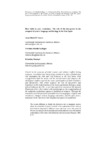
Please use this identifier to cite or link to this item:
http://ricaxcan.uaz.edu.mx/jspui/handle/20.500.11845/1025Full metadata record
| DC Field | Value | Language |
|---|---|---|
| dc.contributor | 253008 | es_ES |
| dc.coverage.spatial | Global | es_ES |
| dc.creator | D´Amore Wilkinson, Anna Maria | - |
| dc.creator | Murillo Gallegos, Verónica | - |
| dc.creator | Zimányi, Krisztina | - |
| dc.date.accessioned | 2019-05-28T20:12:22Z | - |
| dc.date.available | 2019-05-28T20:12:22Z | - |
| dc.date.issued | 2016 | - |
| dc.identifier | info:eu-repo/semantics/publishedVersion | es_ES |
| dc.identifier.issn | 2295-5739 | es_ES |
| dc.identifier.uri | http://ricaxcan.uaz.edu.mx/jspui/handle/20.500.11845/1025 | - |
| dc.description.abstract | Even with the benefit of hindsight, it is difficult to grasp the ingenuity of the interpreters who emerged from their communities to become linguistic mediators at the height of colonialization. Today, there is growing awareness of not only linguistic, but also dialectal differences when employing interpreters in situations of conflict and specialized courses are developed to prepare interpreters as the need arises. Ideas and resources such as these were not available to the first colonizers, nor, indeed, to the colonized. In the specific case of the New Spain, the particular interest of this article, the colonizers had a double agenda: on the one hand, to conquer and exploit the land; on the other, to subdue its inhabitants, primarily through their conversion to the religious ideologies of the Old World. The latter endeavour required the translation and spreading of the Word, which, in turn, necessitated some of the colonizers’ acquiring the indigenous languages or teaching the local population the language of the newcomers, or – ideally – both. | es_ES |
| dc.language.iso | eng | es_ES |
| dc.publisher | Antwerp University | es_ES |
| dc.relation | https://lans-tts.uantwerpen.be/index.php/LANS-TTS/issue/view/17 | es_ES |
| dc.relation.uri | generalPublic | es_ES |
| dc.rights | Atribución-NoComercial-CompartirIgual 3.0 Estados Unidos de América | * |
| dc.rights.uri | http://creativecommons.org/licenses/by-nc-sa/3.0/us/ | * |
| dc.source | Linguistica Antverpiensia, New Series – Themes in Translation Studies centres, Vol. 15 | es_ES |
| dc.subject.classification | HUMANIDADES Y CIENCIAS DE LA CONDUCTA [4] | es_ES |
| dc.subject.other | interpreters | es_ES |
| dc.subject.other | linguistic mediators | es_ES |
| dc.subject.other | dialectal differences | es_ES |
| dc.title | Have faith in your vocabulary: The role of the interpreter in the conquest of power, language and ideology in the New Spain | es_ES |
| dc.type | info:eu-repo/semantics/article | es_ES |
| Appears in Collections: | *Documentos Académicos*-- UA Estudio de las Humanidades | |
Files in This Item:
| File | Description | Size | Format | |
|---|---|---|---|---|
| Have faith in your vocabulary The role of the interpreter in the conquest of power.pdf | 322,7 kB | Adobe PDF |  View/Open |
This item is licensed under a Creative Commons License
